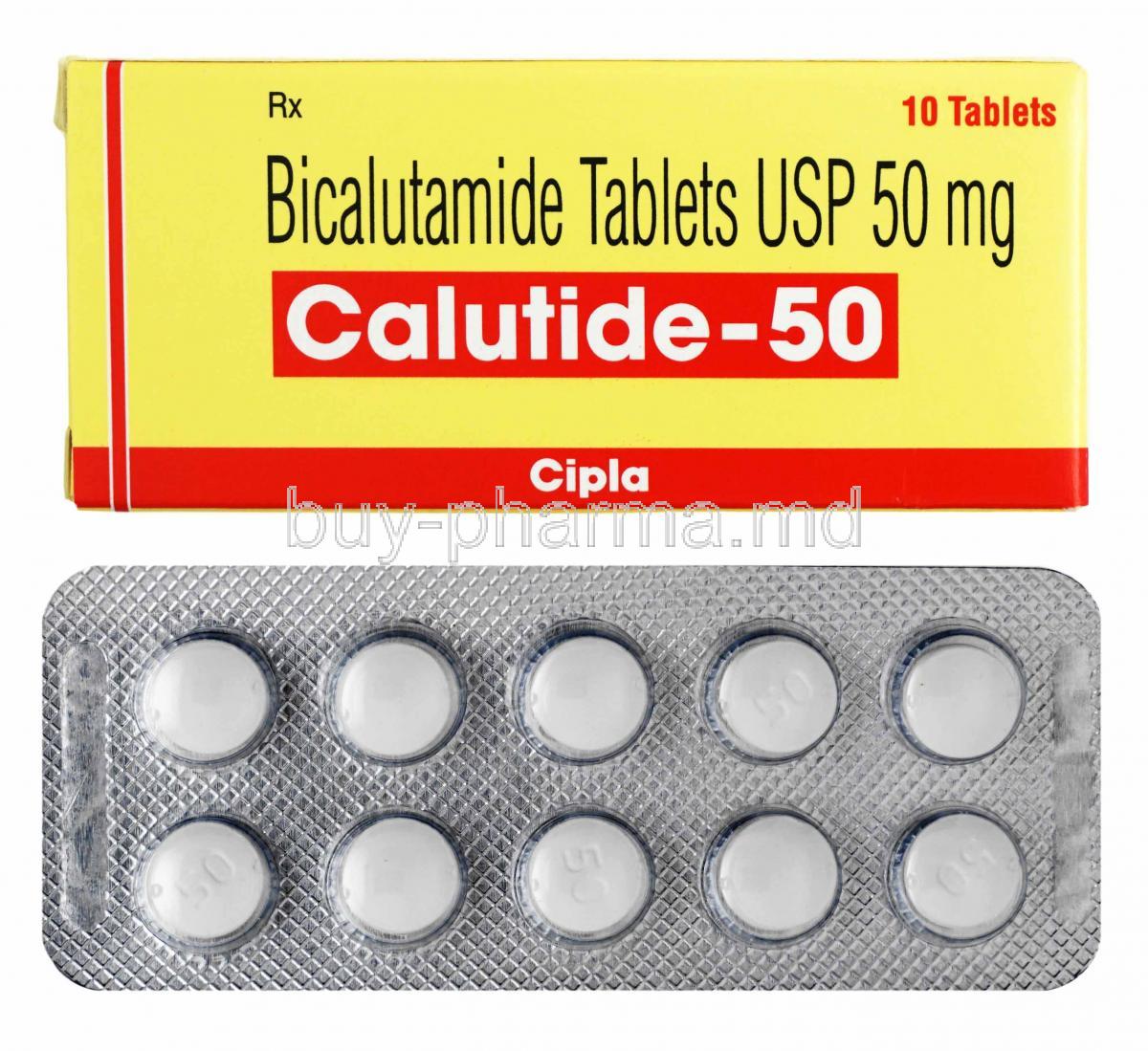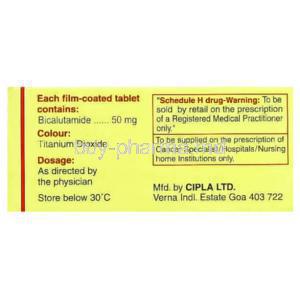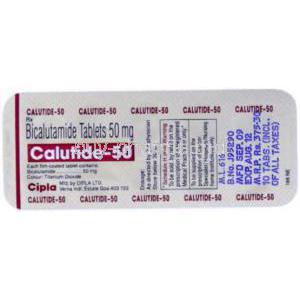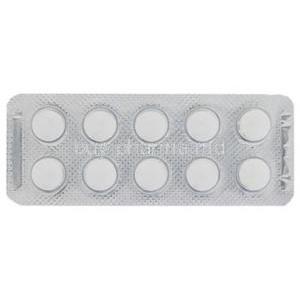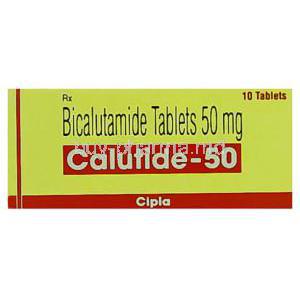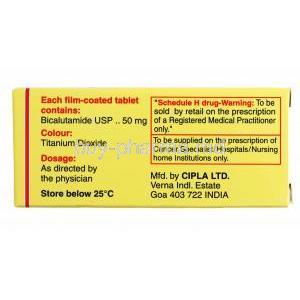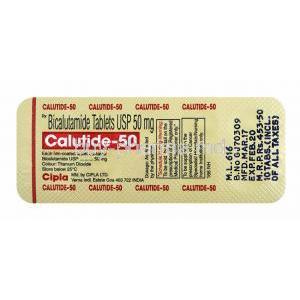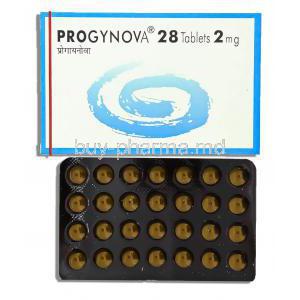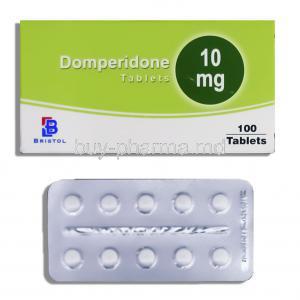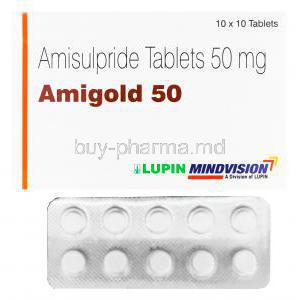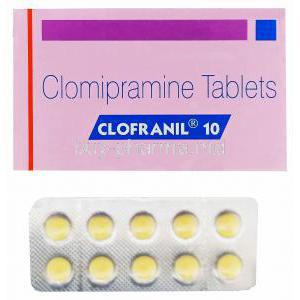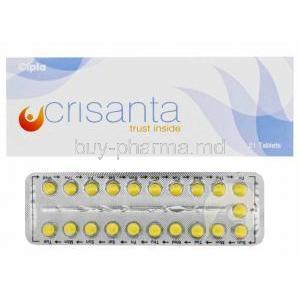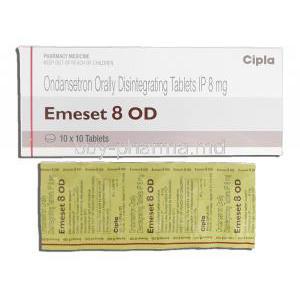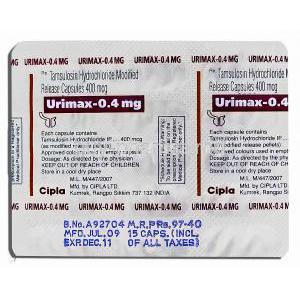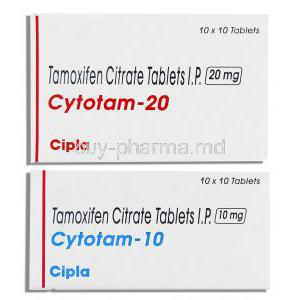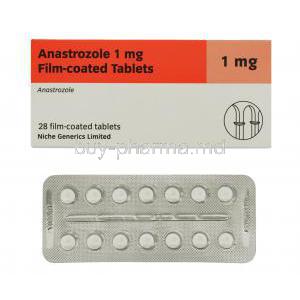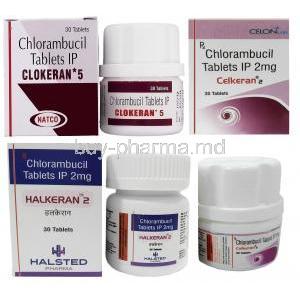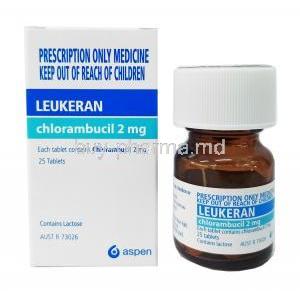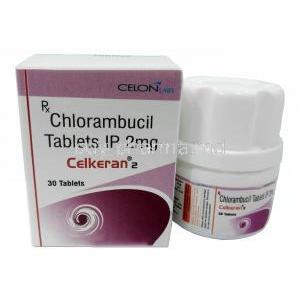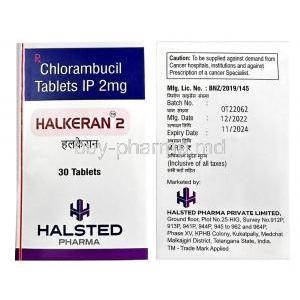Introduction to Calutide (Bicalutamide)
Overview of Calutide as a Non-Steroidal Anti-Androgen Medication
Calutide, containing the active ingredient bicalutamide, is a non-steroidal anti-androgen designed to inhibit the action of androgens in the body. It plays a pivotal role in androgen deprivation therapy, targeting conditions where excessive androgen activity fuels disease progression.
Historical Background and Regulatory Approvals Worldwide
First approved in the 1990s, bicalutamide rapidly gained acceptance as a therapeutic option for prostate cancer. Regulatory bodies such as the U.S. FDA, EMA, and health authorities across Asia and South America have endorsed its use in specific oncological settings.
Therapeutic Class and Relevance in Prostate Cancer Management
Belonging to the pharmacological class of non-steroidal anti-androgens (NSAA), Calutide is integral in the management of androgen-dependent malignancies. It is commonly deployed alongside medical or surgical castration to maximize androgen blockade.
Brand Names, Generic Availability, and Global Market Presence
Marketed under various brand names globally, including Casodex and its generics, bicalutamide is widely accessible. Its affordability and proven clinical profile have ensured broad adoption in both developed and developing healthcare systems.
Medical Uses of Calutide (Bicalutamide)
Primary Approved Uses
- Treatment of Advanced Prostate Cancer: Used in conjunction with LHRH analogues for effective androgen suppression.
- Monotherapy in Locally Advanced Disease: Recommended when other hormonal interventions or surgical castration are inappropriate.
- Combined Androgen Blockade: Often part of multi-drug regimens for metastatic prostate cancer.
Additional Indications in Clinical Guidelines
- Adjuvant therapy after radical prostatectomy or radiotherapy in patients at high risk of recurrence.
- Neoadjuvant therapy to reduce tumor burden before definitive surgical or radiological interventions.
Off-Label and Investigational Uses of Bicalutamide
- Management of androgen-sensitive breast cancer in male patients.
- Treatment of hirsutism in women with PCOS to reduce excessive hair growth.
- Androgen suppression in transgender women as part of gender-affirming therapy.
- Exploration of efficacy in acne and seborrhea linked to androgen overactivity.
- Low-dose regimens in certain gender dysphoria cases for hormonal balance.
How Calutide (Bicalutamide) Works – Mechanism of Action
- Pharmacological Class: Non-steroidal anti-androgen (NSAA).
- Mechanism: Competitively binds to androgen receptors, displacing testosterone and DHT.
- Effect: Inhibits androgen-driven proliferation of prostate cancer cells.
- Pharmacokinetics: Well absorbed orally, extensively metabolized in the liver, excreted primarily via the bile and urine.
Composition and Available Formulations
- Active ingredient: Bicalutamide, C18H14F4N2O4S.
- Common strengths: 50 mg and 150 mg tablets.
- Excipients: May include lactose monohydrate, povidone, magnesium stearate.
- Packaging: Blister packs with protective film to prevent moisture ingress.
Dosage and Administration Guidelines
Standard Dosage for Approved Indications
For advanced prostate cancer, 50 mg once daily is standard when combined with LHRH analogues. In monotherapy for locally advanced disease, 150 mg once daily is commonly prescribed.
Adjustments in Specific Populations
- Hepatic impairment may necessitate closer monitoring.
- Severe adverse effects may require dose suspension or cessation.
Administration Instructions
- Take at the same time each day, with or without food.
- Maintain consistency in administration to optimize therapeutic levels.
- If a dose is missed, skip and continue with the next scheduled dose—never double up.
Possible Side Effects of Calutide (Bicalutamide)
Common Side Effects
- Hot flashes
- Gynecomastia or breast tenderness
- Fatigue, dizziness, headache
- Gastrointestinal disturbances: nausea, constipation, diarrhea
- Skin rash or itching
Serious Adverse Reactions
- Hepatotoxicity, often detected through elevated liver enzymes
- Rare interstitial lung disease
- Severe hypersensitivity reactions
- Cardiovascular complications, especially in predisposed individuals
Drug Interactions with Bicalutamide
- Potentiates effects of oral anticoagulants such as warfarin; INR monitoring is advised.
- Subject to CYP3A4 metabolism—affected by strong inhibitors and inducers.
- Interactions with other hormonal therapies or antiandrogens may alter efficacy.
- Potential impact on drugs metabolized by CYP2C9, CYP2C19, and CYP2D6 pathways.
Warnings and Safety Alerts
Risk of Liver Injury
Bicalutamide has been associated with hepatotoxicity, ranging from mild enzyme elevation to severe liver damage. Warning signs may include persistent nausea, jaundice, dark urine, and unexplained fatigue. Regular liver function tests are advised before initiation and periodically during therapy. If marked abnormalities in liver enzymes or clinical symptoms of hepatic impairment appear, treatment discontinuation is recommended.
Cardiovascular Risk in Patients with Existing Heart Disease
Patients with a history of ischemic heart disease, arrhythmias, or heart failure should be carefully evaluated prior to therapy. Bicalutamide can exacerbate cardiovascular strain by altering hormonal balance. Clinical vigilance, electrocardiographic monitoring, and prompt intervention in case of chest discomfort, palpitations, or edema are essential.
Caution in Patients with Diabetes
Androgen deprivation may influence glucose metabolism, potentially leading to hyperglycemia or destabilization of existing diabetes. Blood glucose monitoring should be intensified, and adjustments in antidiabetic regimens may be required to maintain optimal glycemic control.
Potential for Photosensitivity Reactions
Some individuals may develop heightened sensitivity to sunlight, resulting in erythema, rash, or sunburn-like reactions. Preventive measures such as using broad-spectrum sunscreens and protective clothing are advisable when outdoors.
Contraindications for Calutide Use
- Documented hypersensitivity to bicalutamide or any excipient in the formulation.
- Women, particularly those who are pregnant or planning pregnancy, due to significant anti-androgenic effects on the developing fetus.
- Children and adolescents in the context of prostate cancer treatment, as safety and efficacy have not been established.
Careful Administration and Important Precautions
Baseline Liver Function Tests
Initial hepatic screening is mandatory, followed by regular assessments to detect early signs of drug-induced hepatotoxicity.
Monitoring for Cardiovascular Complications
Blood pressure, heart rhythm, and cardiac performance should be periodically assessed, particularly in patients with pre-existing cardiovascular conditions.
Regular PSA Testing
Monitoring serum prostate-specific antigen levels provides a quantifiable measure of treatment efficacy and disease progression.
Patient Education
Patients should be informed about potential adverse effects, early warning signs, and the importance of adherence to monitoring schedules. Prompt reporting of unusual symptoms can prevent serious complications.
Special Population Considerations
Use in Elderly Patients
Clinical data indicate that bicalutamide maintains efficacy and tolerability in men over 65. However, age-related changes in metabolism may necessitate closer pharmacokinetic observation.
Use in Pregnant Women and Nursing Mothers
Bicalutamide is contraindicated during pregnancy due to the risk of disrupting normal fetal sexual development. Animal studies indicate teratogenic potential. The excretion of bicalutamide into human milk is unknown, and use during lactation is not recommended.
Use in Children
The drug is not approved for pediatric prostate cancer therapy. Although investigational studies have explored its role in other androgen-mediated disorders, safety data remain insufficient for routine use in this population.
Overdose and Emergency Management
Symptoms and Complications
While no specific overdose syndrome has been firmly established, excessive ingestion may lead to gastrointestinal upset, dizziness, or hepatic enzyme disturbances.
Immediate Actions
There is no known antidote. Management is supportive, with emphasis on maintaining vital functions and preventing complications.
Supportive Care
- Symptomatic relief for gastrointestinal symptoms.
- Cardiac monitoring in at-risk patients.
- Frequent laboratory evaluation of hepatic and renal function.
Storage and Handling Precautions
Recommended Conditions
Store at controlled room temperature, ideally between 20°C and 25°C, with protection from excessive humidity.
Light and Moisture Protection
Keep tablets in original blister packaging until use to prevent degradation from light and moisture exposure.
Safe Handling
Wash hands after handling tablets to minimize accidental exposure, particularly for women of childbearing potential.
Disposal
Unused or expired medication should be disposed of through pharmaceutical take-back programs or in accordance with local regulations to avoid environmental contamination or accidental ingestion.
Calutide, Bicalutamide FAQ
- What is calutide used for?
- What is the drug bicalutamide used for?
- How long do you take bicalutamide for prostate cancer?
- What are the side effects of Calutide?
- What to avoid when taking bicalutamide?
- Is bicalutamide considered chemotherapy?
- Can you drink coffee while taking bicalutamide?
- Can bicalutamide increase testosterone?
- What is better than bicalutamide?
- How do you feel when taking bicalutamide?
- How does bicalutamide affect the heart?
- What are the side effects of Calutide 50 mg?
- What foods should you avoid when taking bicalutamide?
- Does bicalutamide shrink the prostate?
- Is fatigue a side effect of bicalutamide?
- Can I take paracetamol with bicalutamide?
- What are the benefits of taking bicalutamide?
- Does bicalutamide cause weight gain?
- How long will I take bicalutamide?
- What is calutide used for?
- How do you feel when taking bicalutamide?
- Is fatigue a side effect of bicalutamide?
- Can I take paracetamol with bicalutamide?
- Does bicalutamide cause weight gain?
What is calutide used for?
Calutide 50 Tablet is used for treating prostate cancer. It's specifically designed to combat this type of cancer, which affects the prostate gland.
What is the drug bicalutamide used for?
Bicalutamide is used to treate metastatic prostate cancer.
How long do you take bicalutamide for prostate cancer?
At least 2 years
What are the side effects of Calutide?
- Rashes
- Fainting
- Decreased urination
- Pain in the upper stomach
- Vision changes
What to avoid when taking bicalutamide?
Alcohol and caffeine
Is bicalutamide considered chemotherapy?
No
Can you drink coffee while taking bicalutamide?
No
Can bicalutamide increase testosterone?
Yes
What is better than bicalutamide?
Enzalutamide stands out as a more effective antiandrogen.
How do you feel when taking bicalutamide?
Bicalutamide makes you feeling weak and drained of energy.
How does bicalutamide affect the heart?
Bicalutamide can have an effect on the body's AR system, and that might be why it can cause problems with blood vessels not being able to dilate properly.
What are the side effects of Calutide 50 mg?
- Weakness
- Rashes
- Weight gain
- hot flushes
- anemia
- decreased libido
What foods should you avoid when taking bicalutamide?
None
Does bicalutamide shrink the prostate?
Yes
Is fatigue a side effect of bicalutamide?
Yes
Can I take paracetamol with bicalutamide?
Yes
What are the benefits of taking bicalutamide?
Bicalutamide blocks the effects of testosterone.
Does bicalutamide cause weight gain?
Yes
How long will I take bicalutamide?
At least 2 years
What is calutide used for?
The Calutide 50 Tablet is a treatment for prostate cancer.
How do you feel when taking bicalutamide?
Bicalutamide can cause you to feel weak and lack energy
Is fatigue a side effect of bicalutamide?
Yes
Can I take paracetamol with bicalutamide?
Yes
Does bicalutamide cause weight gain?
Yes

